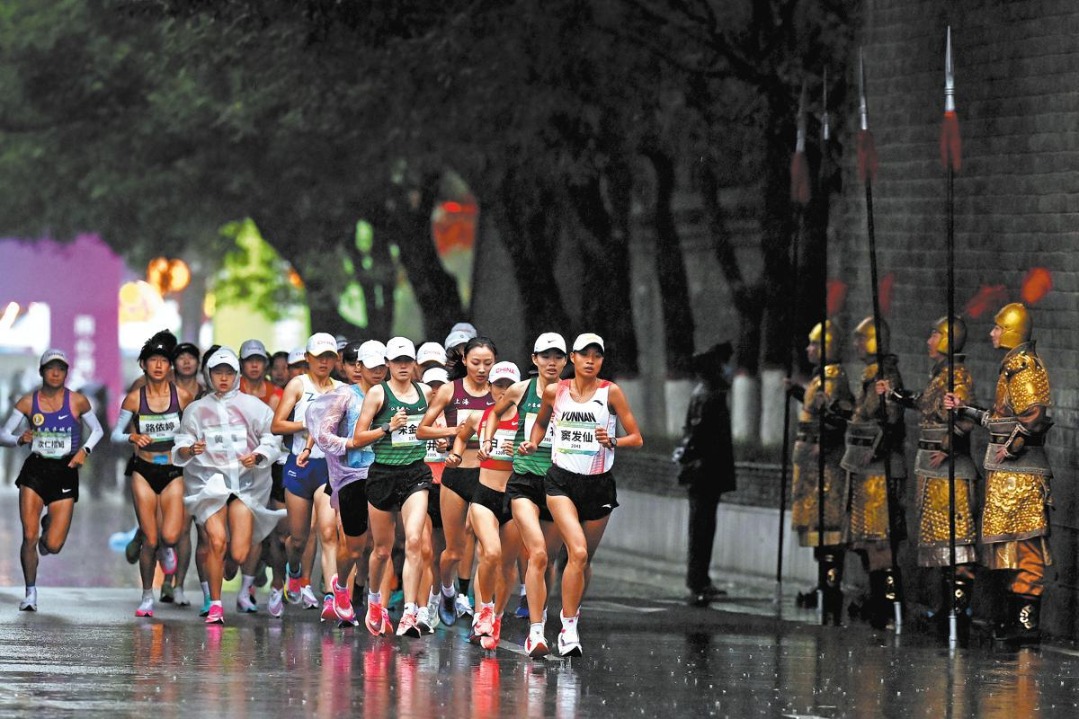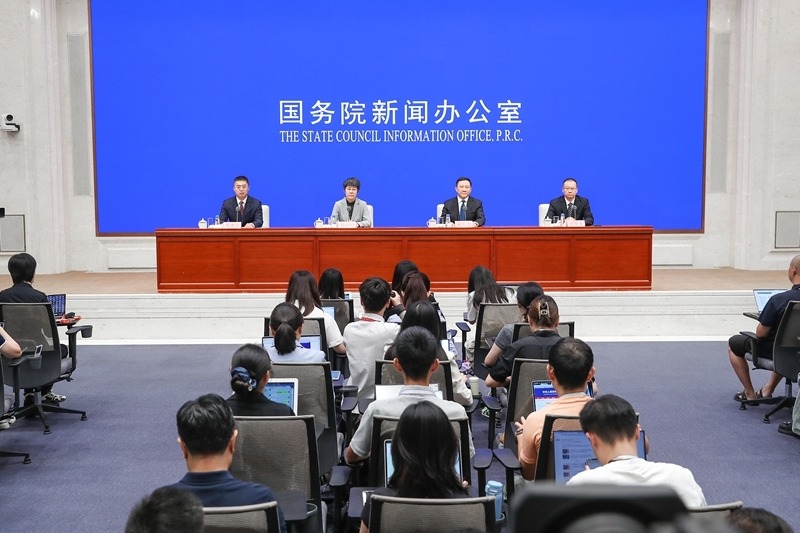Tech hub: A game of patience for Hong Kong


In a world chasing fleeting returns, Hong Kong is betting on a different playbook: harnessing its financial depth, tech ambitions and strategic position in the Guangdong-Hong Kong-Macao Greater Bay Area to champion patient capital - fueling early innovation and inclusive growth far beyond its shores. Luo Weiteng reports from Hong Kong.
Once a city more revered for its financial accolades, rather than invention, Hong Kong has reinvented itself — fast on the surface, patient at its core — over the years as one of Asia's most promising technology hubs.
Yet it now faces a puzzle of patient capital. The steady, long-horizon funding that fuels real transformation has been left wanting amid a chaotic world chasing quick wins.
Leveraging its unique blend of financial prowess and technological ascent, Hong Kong is embracing a broader mission built on sheer patience — nurturing an inclusive innovation that not only advances its own future, but kindles hope and growth for a wider, waiting and less-developed world.
Although investors are flush with capital to capture the next "DeepSeek moment", Lareina Wang, chairperson of the board of the FinTech Association of Hong Kong, is no stranger to contrasting fortunes that dominate every nook and cranny of the local market.
In the realm of patient capital, financial technology remains "notably underrepresented", with funding typically flowing into areas where returns are immediately visible. This is in sharp contrast to sectors like biotechnology and life sciences, where there tends to be "more patience and even forgiveness" for returns that may take a decade to materialize, Wang says.
In a similar fashion, "there's always a place for fresh startups, whether it's in artificial intelligence, digital assets or Web3, to feast on rounds of investment," she says. "But, for ventures that truly need patient capital, like those focused on financial inclusivity or financial education, you could hardly see them get funded."
Even within the red-hot AI space, the bulk of investment is skewed toward later-stage companies, with big names winning the lion's share.
In the first quarter of this year, San Francisco-based tech giant OpenAI's record-breaking $40 billion single-round deal accounted for more than half of all United States' venture funding and one-third of the world's, according to Crunchbase data.
Fragmented perspectives
Patience has become a rare commodity. The real question, Wang points out, is how to help ventures get off to a strong start, rather than waiting for a sure bet and joining the rush for a slice of the pie.
The issue resonates across Asia.
Sopnendu Mohanty — group CEO of Global Finance and Technology Network, a not-for-profit entity set up by the Monetary Authority of Singapore — sees most venture capital invested with a "private equity lens".
"Private equity, typically, seeks lower risks and higher returns on a shorter cycle, whereas venture capital is designed to take on greater risks over a longer horizon," he explains.
For traditional financial institutions, Mohanty points to "regulatory and structural hurdles" that further complicate the picture. "Under the Basel framework, if banks allocate over 10 percent of their regulatory capital, they face a 400 percent risk-weighted asset requirement and, in certain categories, that could climb to 1,000 percent. This leaves them virtually bound hand and foot when it comes to backing early-stage startups that need patient, long-term capital."
For fledgling startups, the high walls of traditional banking, built on rigorous compliance standards and collateral-heavy requirements, are simply out of reach. Even when banks' corporate venture arms offer a way in, Mohanty says, there's an entrenched "bank culture" that leaves founders struggling to secure follow-on rounds.
Wang still vividly remembers how a mountain of paperwork and endless compliance checks caused a promising partnered startup — then a scrappy team of fewer than 10 — to collapse when she was working with a bank in London years ago.
Beyond banks' deep-rooted norms, a harsh reality unfolds amid a highly uncertain global climate, where judging long-term risk and justifying bold investments remain particularly challenging: Follow-on funding is drying up across the investment world, and the "flight to quality" trend has its logic — startup success rates linger between just 5 to 10 percent, Wang adds.
On the public policy front, Benedicte Nolens, who heads the BIS Innovation Hub Hong Kong Center at Bank for International Settlements, senses a wind of serious change. Hong Kong's much-awaited Stablecoins Ordinance took effect on Aug 1, fleshing out the city's ambition to be a crucible for testing world-class financial technology solutions.
Across the Pacific, a sweeping shift is underway. The adoption of the Genius Act — the United States' first major federal cryptocurrency legislation — in July, and the introduction of the Stable Act in March, along with blockbuster initial public offerings of stablecoin issuer Circle, have dominated headlines.
"Let's not underestimate the power of public policy, whether as a weapon or a lever," says Nolens, underscoring the due role of government. "The most patient capital comes from a patient government. That's what makes all this possible."
Mohanty envisions a blended capital approach — state capital paired with private investment — to shoulder risks in socially significant tech innovation. Patience in capital, he argues, isn't necessarily about sheer abundance, but a "steady, mandate-driven flow of funding" that keeps long-term ambitions intact.
In Hong Kong, that patience is clear in the special administrative region government-owned Hong Kong Investment Corp, which has backed over 100 projects since its founding in 2022, with AI and robotics leading the charge.
Every Hong Kong dollar the corporation has invested attracts HK$4 (51 US cents) of long-term private capital, and five to 10 firms in its portfolio are considering local listings this year, with some already at the market's doorstep, according to Clara Chan Ka-chai, CEO of HKIC, which manages funds exceeding HK$60 billion.
Longtermism carries a different lens. The SAR government's investment arm is "less swayed" by noises at the moment — geopolitical headwinds, monetary policy swings, inflationary pressures and supply-chain disruptions. It channels its attention instead to tangible opportunities in high-potential, nascent-stage industries, grounded in "a mandate that spans cycles and generations".
The mandate now meets its moment in a tech revolution, and in a city and region rising to make waves.
"Hong Kong today is telling a different story," says Chibo Tang, managing partner of venture capital firm Gobi Partners. Startup numbers have surged from 1,500 in 2015 to nearly 5,000 at present. The innovation and technology sector that once contributed less than 2 percent to Hong Kong's GDP, now makes up 7 to 10 percent, and is on track to rival finance as the city's next economic backbone, with a projected share exceeding 20 percent in the coming decade, Tang estimates.
Hong Kong has become even more pivotalto the Guangdong-Hong Kong-Macao GreaterBay Area — the nation's seat of technologicalinnovation — not just as a global gateway, but as a magnet for venture capital. According to Tang, its venture funding is projected to soar to $5 billion this year from less than $500 million in 2015. Once a city with scarcely a unicorn — a privately owned startup valued at $1 billion or more — in sight, Hong Kong now hosts an estimated 15 to 20. Across the border, Shenzhen is flexing its financial muscles to take its place in the arena of "bold capital".
Power of technology
Technology itself, Mohanty observes, lies at the very core of patient capital. He has seen no shortage of financial centers touting their patient capital credentials while ending up preoccupied with liquidity distribution. "That's not true technology-driven, long-term investment. Unless patient capital follows real technology, it's hard to place meaningful bets on early-stage innovation."
As Hong Kong nurtures closer ties with the Middle East for collaboration, the resource-rich region is a compelling example of putting technology at the heart of funding innovation.
Calvin Fu, chairman of the China Innovation Finance Institute, says sovereign wealth funds — the most patient asset owners from resource-driven developing economies — are strategic levers of statecraft, rather than purely financial instruments. Beyond preserving intergenerational wealth and safeguarding national assets, their greater impact lies in steering capital toward industries that drive economic transformation and guide nations through critical stages of strategic development.
Last year, Middle Eastern sovereign wealth funds allocated about half of their direct investment to infrastructure and real estate, with a marked tilt toward cloud-based and data-driven assets, reflecting the region's push to anchor itself in next-generation technologies.
Fu is aware of a quiet yet consequential shift. While top-tier asset managers from developed markets still hold sway, emerging-market managers are gaining ground. What sets the latter apart is a mix of on-the-ground knowledge of promising regional enterprises that deliver superior portfolio returns, and the capacity to marry capital with practical technological solutions that align seamlessly with long-term transformation agendas.
This blend, he points out, roots the Middle East in a defining theme of innovative productivity. Last year, the region's sovereign wealth funds doubled tech allocations to 14 percent, compared with 2023.
"The transformation of core industrial sectors has become the real certainty in these uncertain times. The same holds true for finance," says Joel Ruet, chairman of the Paris-based Bridge Tank. "Here, finance follows and serves technology, not the reverse."
Globally, developed economies continue to absorb 80 percent of sovereign wealth funds' allocations, despite a gradual shift toward developing markets over the past five years, Fu notes.
Hong Kong's allure
Such sustainable goals and funding gaps have sharpened Hong Kong's relevance as a city built on capital access and embedded within the Greater Bay Area, a powerhouse of manufacturing and innovation that serves the world with practical, cost-effective solutions.
In a recent interview with China Daily, Jeffrey Sachs, professor and director of the Center for Sustainable Development at Columbia University, described Hong Kong's pursuit of reasonable, patient capital as a call to action beyond its shores, reaching those long "left behind", where even the least advanced economies yearn for fintech, infrastructure and clean solutions to climb up the value chains, and no longer want to sideline as passive recipients.
"They seek co-development and co-creation, with a shared stake in the very ecosystem they join," says Ruet. "This is where Hong Kong is structurally positioned and purpose-built to come into play."
Mohanty frames such a robust and inclusive ecosystem — built beyond cash, markets, regulatory channels and pilot projects — as a viable answer to the challenges woven into early-stage investment. "The deeper and more comprehensive the ecosystem, the broader the cushion and runaway for patient capital to navigate risks."
An ecosystem flourishes when every stakeholder finds its place, and universities themselves, doubling as intellectual and financial patient capital, are central to that equation. "They must step in, champion the cause and bring high-quality talent to the ecosystem," urges Mohanty, who attributes much of Silicon Valley's strategic strength to its academic foundations.
Hong Kong's appeal as a top-tier, stable and culturally inclusive academic destination, drawing on world-class universities, applied research resources and the finest minds in the Greater Bay Area, stands out even more sharply in the wake of recent turbulence at elite US institutions.
For Mohanty, it all comes down to the "right talent". He says "upskilling and finding the right people could be the answer to impatient capital", which is too often deployed by those who stumble into investing by chance or luck, with little understanding of the technologies they back and the long-term architecture that sustains such an ecosystem.
What may also be expected are the growing participation and contributions of successful startup founders who are "emerging as a new class of investors", says Mohanty. They return with more than money, bringing scars and stories, lessons from the trenches, and a seasoned understanding of risk that resonate deeply with early-stage entrepreneurs.
This founder-led reinvestment sets in motion a virtuous loop of patient capital — past successes fueling future ventures and an ecosystem renewing itself from within, less reliant on traditional funding and sustained by those who know the journey best.
Contact the writer at sophialuo@chinadailyhk.com
- Tech hub: A game of patience for Hong Kong
- Floods wreak havoc, heavy rain to continue
- Rural rattan crafts from Guangxi gain global attention
- China urges Philippines to stop stirring up troubles in South China Sea
- Visit China | How can Tianjin, home of this month's SCO summit, be both ancient and modern?
- Liaoning Provincial Museum serves history-inspired summer treats




































